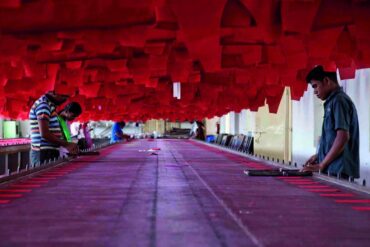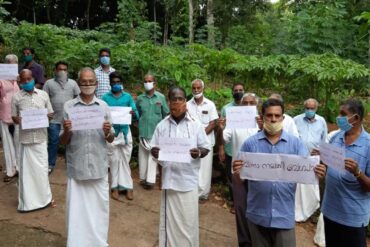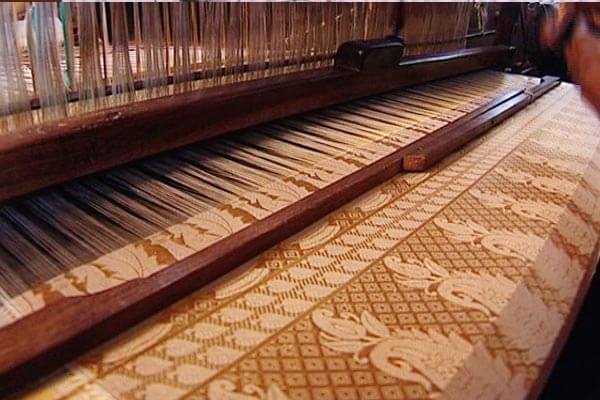For each Malayalee, a traditional Kerala festival, may it be Onam, Vishu, temple festival or one’s own birthday, is incomplete without the traditional Kerala dhothis and sarees. Kuthampully, a village on the banks of Bharathappuzha is famous for its own hand-loomed Kerala style clothing. Around 600 families here in this village are engaged in the making of ‘kasavu’ sarees, veshti, dhoti and ‘settu mundu’ which are highly accepted not even in Kerala, but around the world and across the cultures.
Though the natives are proud of their products and the acceptance they receive across the borders, the handloom industry here is on the verge of closure owing to lack of interest among the new generation to stick to their traditional business and to get settled in the village itself. Besides, the Government’s financial policies and ignorance of the craftsmen also make them put an end to this age-old employment.
“It is said that our ancestors came from Mysore to weave clothing for the king of Kochi centuries ago. They got settled here and made this village their home. Eventually, they started to sell them to the public who are interested. Thus, our products became quite famous among the local people and the outsiders,” says Saravanan (name has been changed to protect identity). The village is situated at Thiruvilwamala panchayat of Thrissur district.
Almost all houses in the village are having its own weaving set up. Saravanan runs a small-scale business while there are several massive businessmen in the area. “There is competition here. But we do care to be helpful to each other. We try to maintain uniformity in rates and quality though there may be minute variations in prices and quality according to the labour and profit requirements,” he said.
 People even from faraway places come to Kuthampully to buy traditional wears in large numbers. The shopkeepers sell the clothing at wholesale rate. “We do sell hand-loomed as well as power-loomed items. Hand-loomed items will have higher price compared to the power-loomed ones. While individual buyers prefer handloom materials, the wholesale buyers demand power-loomed materials. This tendency has its impact on our business as we are inclined to switch to power-loomed products owing to its higher demand from the wholesale customers,” he said.
People even from faraway places come to Kuthampully to buy traditional wears in large numbers. The shopkeepers sell the clothing at wholesale rate. “We do sell hand-loomed as well as power-loomed items. Hand-loomed items will have higher price compared to the power-loomed ones. While individual buyers prefer handloom materials, the wholesale buyers demand power-loomed materials. This tendency has its impact on our business as we are inclined to switch to power-loomed products owing to its higher demand from the wholesale customers,” he said.
Kuthampully has a village assembly which is headed by the senior member of the community. The villagers have not set up power looms in their workshops as they produce noise pollution. “It was a decision taken by the village assembly. Our power looms are situated at various places in Tamil Nadu including Salem, Erode and Madurai. We bring the power-loomed materials from there,” Saravanan said.
Several shopkeepers here even sell the power-loomed products in the label of hand-loomed materials, he continued. People who cannot distinguish between the hand-loomed products from the power loomed are manipulated by these sellers and buy the power-loomed products at the price of hand-loomed ones. A handloom ‘settu mundu’, without much work other than the simple ‘kasavu’ line on the border, may range from Rs.800 to Rs.1,000 while the price of the similar power-loomed material may be between Rs.400 and Rs.600.
“But most of the families here are undergoing severe crisis as there lesser takers for hand-loomed products and the younger generation’s disapproval of this employment. Since we know how pathetic the condition of our business is, we do not encourage our children to take up this business. Instead we teach them and help them get employed outside. I think, with this existing generation, Kuthampully will lose its traditional business. In the past 15 years, almost 500 weavers have quit the profession,” Saravanan said.
The Government’s policies such as introduction of GST has affected Kuthampully handloom weavers badly as the price of cotton, needle and other raw materials have increased. Besides, the private handloom weavers do not get any grant or other Government support to boost their confidence. The Kuthampully Handloom Industrial Cooperative Society was set up in 1972 and it engages around 1,000 labourers. They receive a small amount of grant from the Government during festival seasons apart from a small sum of pension and several other benefits. Those who run business at their houses do not receive any such grants or allowances.
“We don’t expect the Government to help us set up power looms as that would not be accepted by the village assembly here. But it would be a real help if the Government reduces the GST rates on our raw materials,” Saravanan said.







